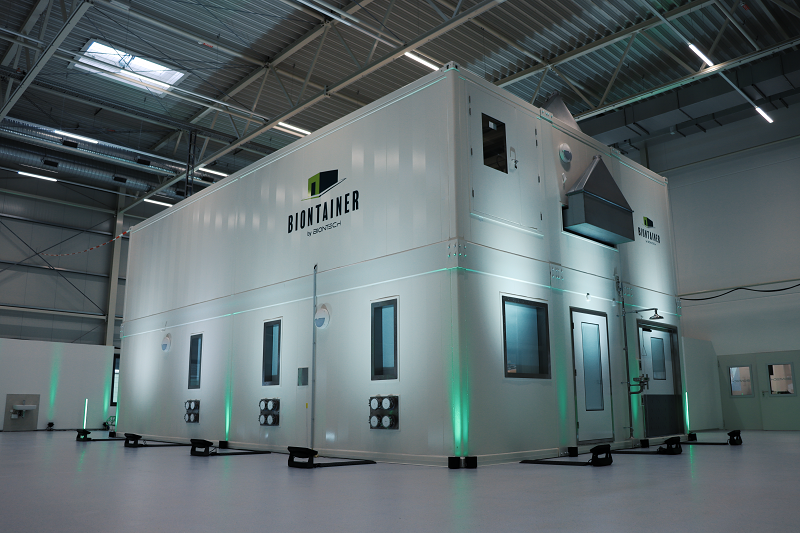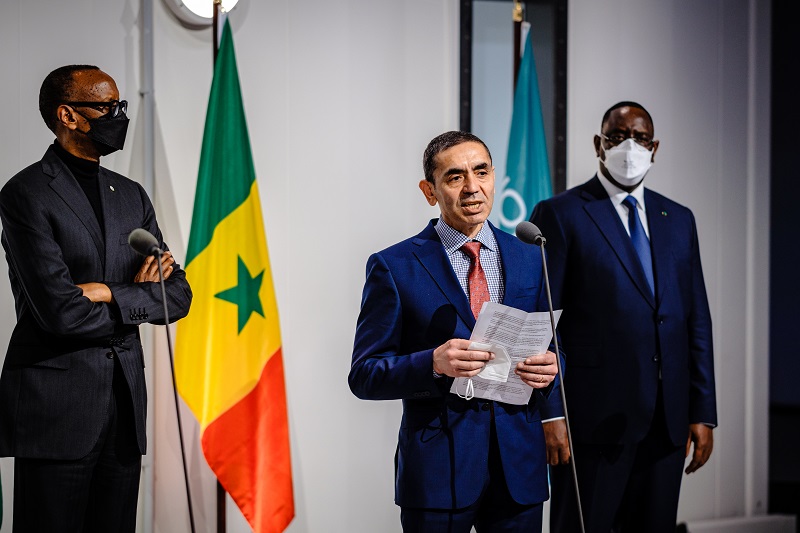BioNTech invents
mobile vaccine manufacturing modules

BioNTech designs mobile manufacturing units based on transportable modules for the manufacture of messenger RNA vaccines, capable of responding flexibly and quickly to the appearance of new variants, particularly in Africa.
In 2020, Ugur Sahin, co-founder of BioNTech with his wife, Özlem Türeci, had the intuition that the messenger RNA (mRNA) technology mastered by his company could be an asset in the rapid development of an effective vaccine against what would become the Covid-19 pandemic. Thanks to a partnership established very early with the American Pfizer, the biotech was the first company to obtain the approval of its vaccine, today one of the most distributed in the world with 2.6 billion doses sold in more than 160 countries.
Two years later, Ugur Sahin intends this time to accelerate the large-scale distribution of future vaccines based on mRNA. To meet this objective, BioNTech unveiled, in mid-February, transportable units for the semi-automated manufacture of messenger RNA vaccines, called "BioNTainer". These production units are made up of twelve containers. Each production unit is able to respond flexibly to a specific demand for vaccines. These mobile units have the advantage of being very easily transported and being installed very quickly in a region of an emerging country in order to produce doses of a quality equivalent to that of a highly industrialized country. Messenger RNA vaccines have the advantage of requiring much less space, resources and time to produce than conventional vaccines
The manufacturing solution consists of one drug substance and one formulation module. Each module is built of six ISO sized containers (2.6m x 2.4m x 12m). This allows for mRNA vaccine production in bulk (mRNA manufacturing and formulation), while fill-and-finish will be taken over by local partners. Each BioNTainer is a clean room which BioNTech equips with state-of-the-art manufacturing solutions. Together, two modules require 800 sqm of space and offer an estimated initial capacity of for example up to 50 million doses of the Pfizer-BioNTech COVID-19 vaccine each year. The BioNTainer will be equipped to manufacture a range of mRNA-based vaccines targeted to the needs of the African Union member states, for example the Pfizer-BioNTech COVID-19 vaccine and BioNTech's investigational malaria and tuberculosis vaccines, if they are successfully developed, approved or authorized by regulatory authorities.

The establishment of the first mRNA manufacturing facility by BioNTech in the African Union is expected to start in mid-2022. The first BioNTainer is expected to arrive in Africa in the second half of 2022. Manufacturing in the first BioNTainer is planned to commence approximately 12 months after the delivery of the modules to its final location in Africa. BioNTech expects to ship BioNTainers to Rwanda, Senegal and potentially South Africa in close coordination with the respective country and the African Union. BioNTech will be responsible for the delivery and installation of the modules, while local organizations, authorities and governments will ensure the needed infrastructure. Partners in Ghana and South Africa could support the manufacturing with fill-and-finish capacities. BioNTech will work closely with local authorities to ensure compliance to relevant regulatory procedures of the national regulatory agencies in each partner country, and also coordinate where appropriate with relevant continental and international agencies, including WHO, Africa CDC, the African Medicines Agency (AMA), and the African Union Development Agency (AUDA-NEPAD).
BioNTech will initially staff and operate the facilities to support the safe and rapid initiation of the production of mRNA-based vaccine doses under stringent good manufacturing processes ("GMP") to prepare for the transfer of know-how to local partners to enable independent operation. Vaccines manufactured in these facilities are expected to be dedicated to domestic use and export to other member states of the African Union at a not-for-profit price.
RELATED Biovac to start making Pfizer-BioNTech COVID-19 vaccine in early 2022
